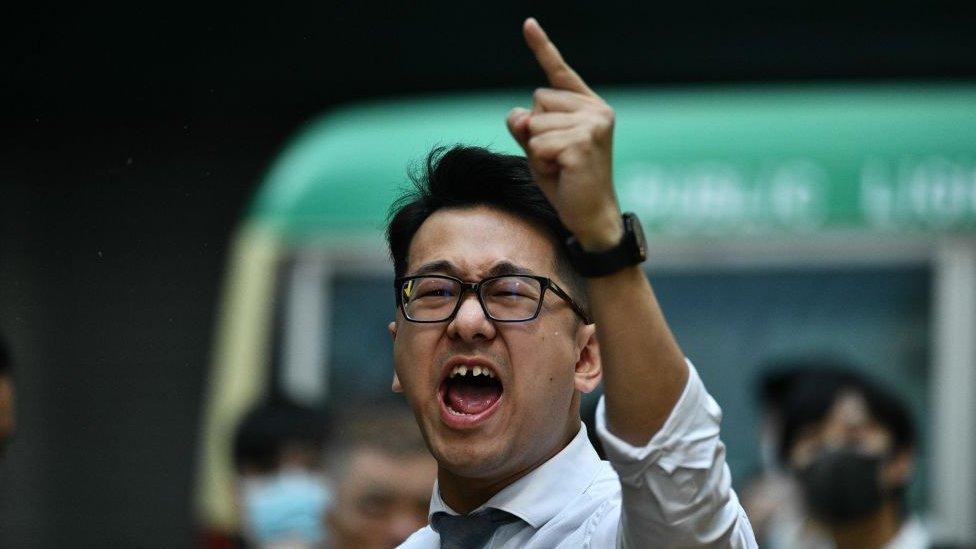Hong Kong jails 45 pro-democracy campaigners for subversion
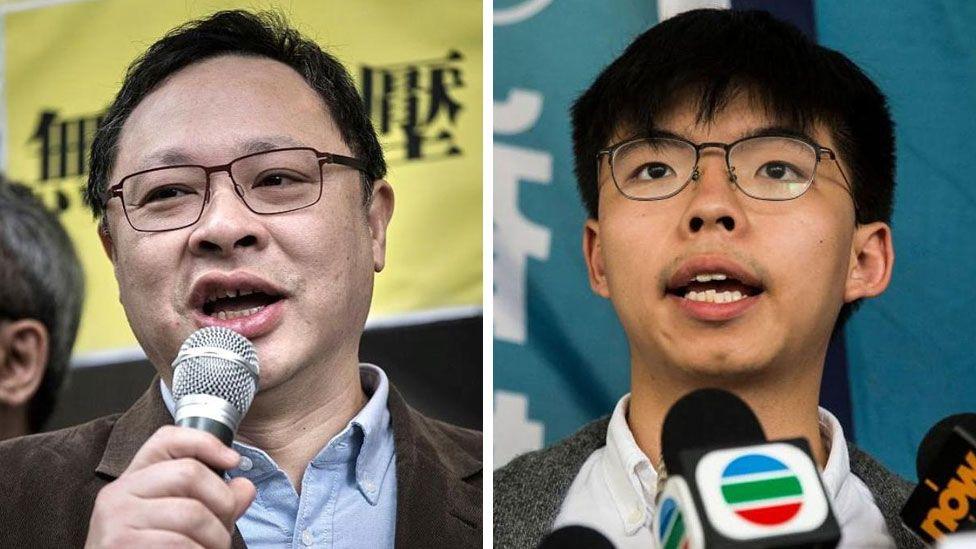
Benny Tai (left) was jailed for 10 years and Joshua Wong (right) for four
- Published
A Hong Kong court has sentenced dozens of pro-democracy leaders to years in jail for subversion, following a controversial national security trial.
Benny Tai, 60, and Joshua Wong, 28, were among the so-called Hong Kong 47 group of activists and lawmakers who were involved in a plan to pick opposition candidates for local elections.
Tai received 10 years while Wong received more than four years. A total of 45 people were jailed for conspiring to commit subversion. Two of the defendants were acquitted in May.
This was the biggest trial under the national security law (NSL) which China imposed on the city shortly after explosive pro-democracy protests in 2019.
Hundreds of thousands took to the streets in a months-long standoff against Beijing. Triggered by a proposed government treaty that would have allowed extradition to mainland China, the protests quickly grew to reflect wider demands for democratic reform.
Observers say the NSL and the trial's outcome have significantly weakened the city’s pro-democracy movement and rule of law, allowing China to cement its control of the former British colony.
Who are the activists jailed in Hong Kong's largest national security trial?
- Published19 November 2024
What is Hong Kong's national security law?
- Published19 March 2024
Beijing and Hong Kong’s government deny this, arguing instead that the NSL is necessary to maintain stability. They also say these sentences serve as a warning for those trying to undermine China’s national security.
"No one can engage in illegal activities in the name of democracy and attempt to escape justice," China's foreign ministry said on Tuesday. It also said that it was "firmly opposed" to Western countries "undermining the rule of law in Hong Kong".
'Their families are devastated'
The city's pro-democracy campaigners reacted to the sentences with disappointment and sadness.
"We are very distressed and their families are devastated," Emily Lau, former chair of the Democratic Party of Hong Kong, told the BBC's Today programme.
She added that she and many others were not able to enter the courtroom because it was full. Tuesday's hearing attracted huge interest from Hongkongers, dozens of whom queued up outside days before to secure a spot in the public gallery.
Many of the 45 people on trial were icons of Hong Kong's protest movement. Tai, a law professor, shot to fame as a key leader back in 2014, Wong was still a teenager when he took to activism, and Gwyneth Ho, a young former journalist, was admitted to hospital after a mob attack during the 2019 protests.
Veteran former lawmakers such as Claudia Mo and Leung Kwok-hung, also known as Long Hair, spent much of their careers fighting for a freer Hong Kong, and first-time activists such as Owen Chou and Tiffany Yuen stormed the legislative council in what was a defining moment for the protests.
All of them were in court in a rare public appearance as many have been in jail since their arrest in early 2021 because pre-trial detention is common under the NSL.
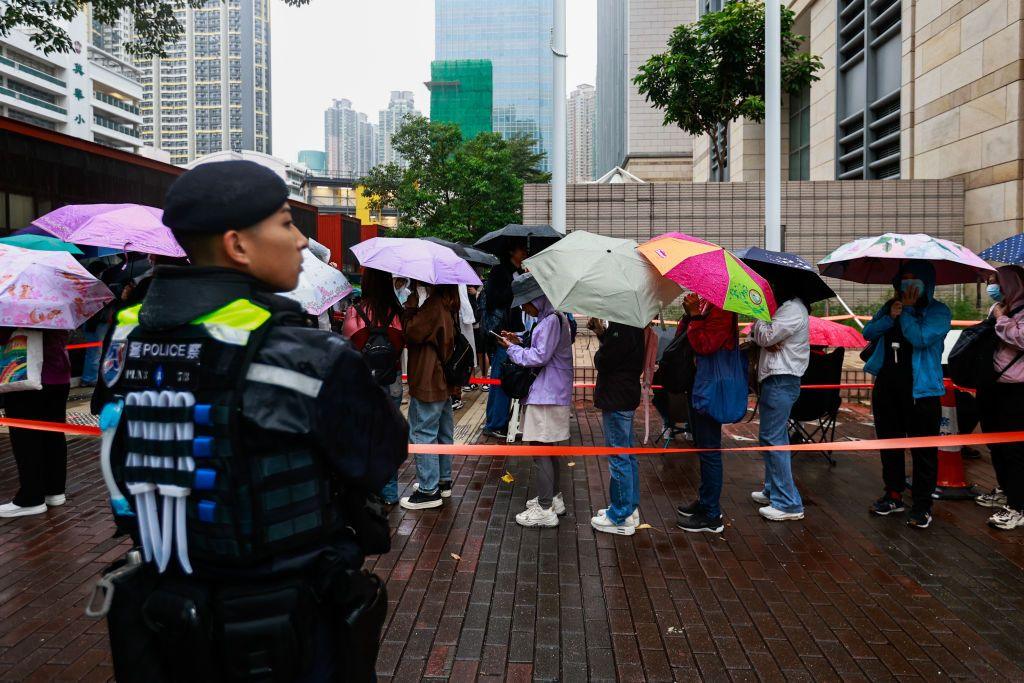
A heavy police presence was seen as huge crowds queued up for public gallery seats
Standing in line on Tuesday was Lee Yue-shun, one of the two defendants acquitted. He told reporters he wanted to urge Hongkongers to "raise questions" about the case, as "everyone has a chance to be affected" by its outcome.
There were several activists waiting to enter court. Bobo Lam, who was once arrested under the NSL, said he was showing up to support friends who are now in jail and "let them know, that there are still many HongKongers who haven't forgotten them". Others seemed heartened by how many people had showed up, suggesting they "remember what happened".
An elderly woman, Regina Fung, chanted "everybody hang in there, stand for Hong Kong" before the hearing. "It's very sad, even the weather in Hong Kong is miserable today," she said.
Inside the courtroom, family members and friends waved from the public gallery to the defendants, who appeared calm as they sat in the dock. Some in the gallery had tears in their eyes as the sentences, ranging from four to 10 years, were read out.
Tai, a former law professor who came up with the plan for the unofficial primary, received the longest sentence with judges saying he had "advocated for a revolution".
Wong had his sentence reduced by a third after he pleaded guilty. But unlike some other defendants, he was not given further reductions as judges "did not consider him to be a person of good character". At the time of the arrests, Wong was already in jail for participating in protests.
In court, Wong shouted "I love Hong Kong" before he left the dock.
As Leung's wife, activist Chan Po-ying, walked out of the court at the end of the hearing, she was heard chanting a protest against his jail term.
The 'illegal' primary
The UK government said those sentenced had been "exercising their right to freedom of speech, of assembly and of political participation".
"Today’s sentencing is a clear demonstration of the Hong Kong authorities’ use of the NSL to criminalise political dissent," a UK government statement said.
The US has described the trial as “politically motivated”. Australia said it had "strong objections" to the use of the NSL and it was "gravely concerned" by the sentencing of one of its citizens, Gordon Ng.
The ruling comes a day after UK Prime Minister Sir Keir Starmer met with China's Xi Jinping at the G20 summit - a meeting which saw him raise the case of Jimmy Lai, the billionaire pro-democracy activist on trial for national security offences.
Asked directly about Tuesday's ruling, he defended pursuing closer ties with Beijing, saying that while it was "important" to be "open... and talk about our disagreements", it was also in the "national interest" to have a" serious and pragmatic relationship" with China.
"I certainly hope the British government, the prime minister, will stand up for the rights that they promised the Hong Kong people. All these promises, these rights and rule of law are evaporating," Ms Lau told the BBC. She asked why organising an election should warrant jail time.
After the 2019 protests dwindled with the Covid pandemic, the defendants organised an unofficial primary for the Legislative Council election as a way to continue the pro-democracy movement.
Their aim was to increase the opposition’s chances of blocking the pro-Beijing government’s bills. More than half a million Hongkongers turned out to vote in the primary held in July 2020.
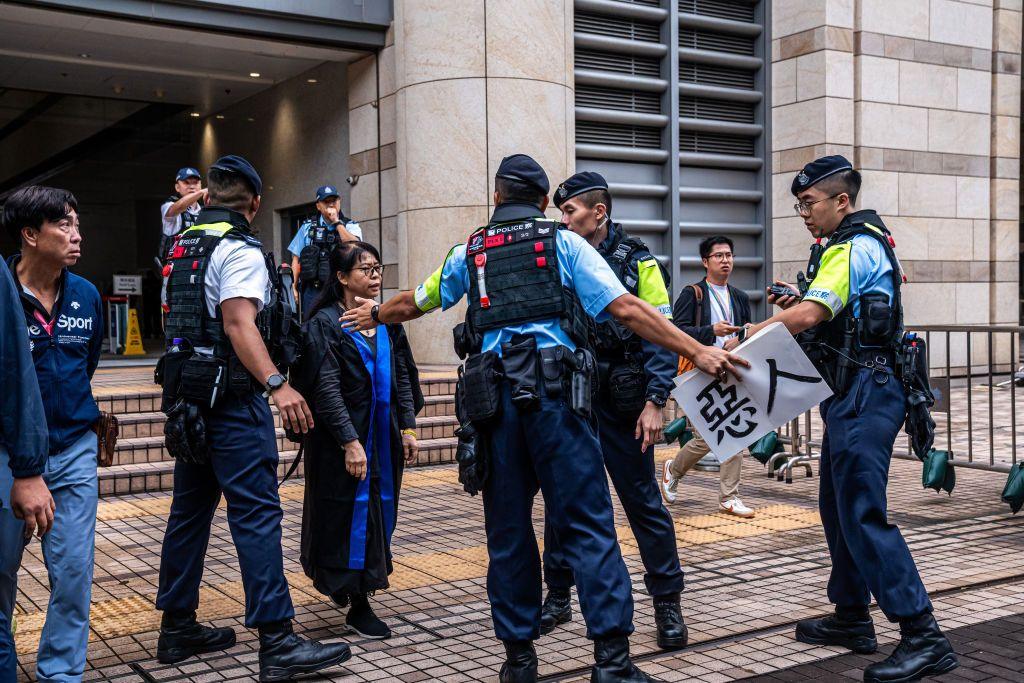
Police officers confiscated a protest banner from a relative of one of the defendants as she left the court
Organisers argued at the time that their actions were allowed under Hong Kong's Basic Law - a mini-constitution that allows certain freedoms.
But it alarmed Beijing and Hong Kong officials, who warned that the move could breach the NSL, which came into effect days before the primary. They accused the activists of attempting to “overthrow” the government, and arrested them in early 2021.
The trial judges agreed with the prosecution’s argument that the plan would have created a constitutional crisis.
'National security is the priority'
"Central authorities are using the trial to re-educate the Hong Kong people," said John P Burns, emeritus professor at the University of Hong Kong. The lesson being "national security is the country’s top priority; don’t challenge us on national security’”.
"The case is significant because it provides clues to the health of Hong Kong’s legal system," he told the BBC. "How can it be illegal to follow processes laid down in the Basic Law?"
A Human Rights Watch spokesperson said that China and Hong Kong "have now significantly raised the costs for promoting democracy in Hong Kong".
Stephan Ortmann, assistant professor of politics at the Hong Kong Metropolitan University, agreed. Tuesday's sentencing "set a precedent for the severity of punishments for political dissent under the NSL", adding that "self-censorship has become the norm".
But this isn't a win for Beijing, said Sunny Cheung, an activist who ran in the 2020 primary but has since fled to the US. "They might be happy in a way because the entire opposition is being wiped out... but they don’t have the trust of the people.”
Others, like Ms Lau, said the city had already lost more than a generation of pro-democracy campaigners.
There has been "no permission for marches and demonstrations in the past few years - it's very, very quiet, very peaceful," she said.
"But that's not Hong Kong. If you have been to Hong Kong, you know it is a city of protest. Very colourful, very vibrant, but not any more."
Related topics
- Published18 December 2023
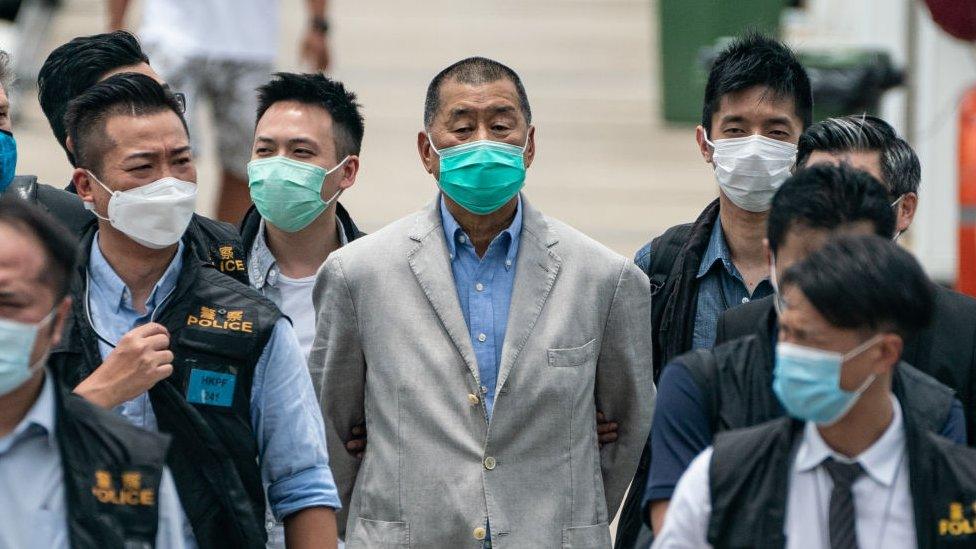
- Published13 December 2023
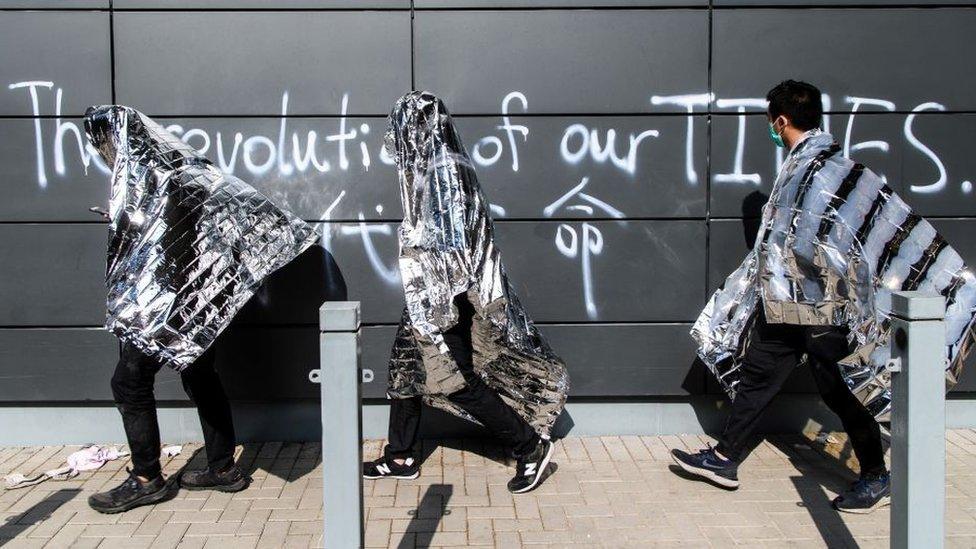
- Published31 August 2020
